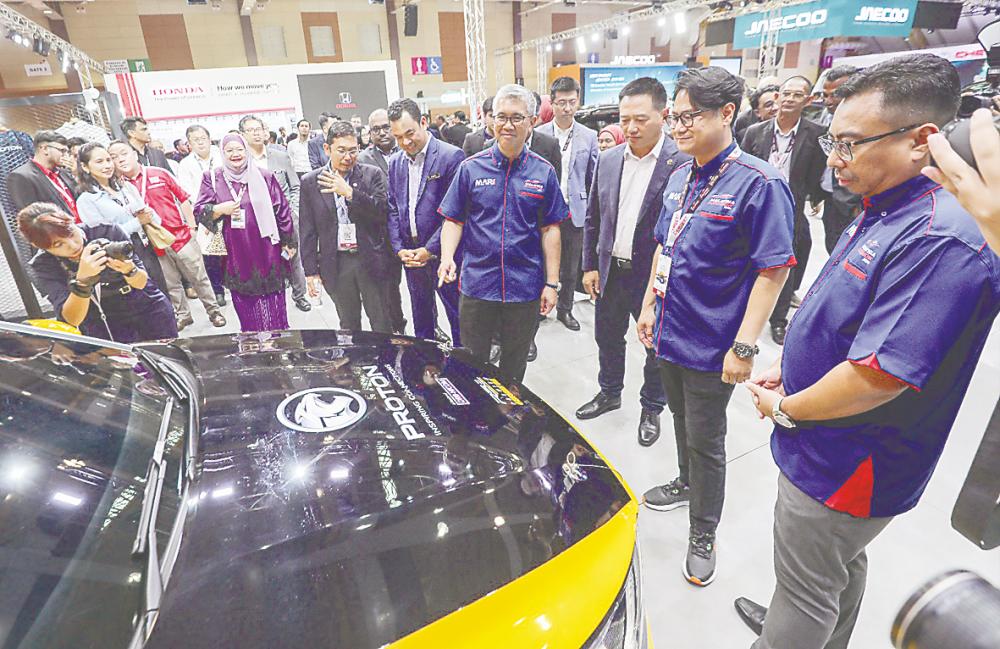SERDANG: The vision to make Malaysia an automotive export hub is highly achievable on the back of the government’s robust policies such as the National Automotive Policy 2020 (NAP 2020) and the New Industrial Master Plan 2030 (NIMP 2030), said Investment, Trade And Industry Minister Tengku Datuk Seri Zafrul Abdul Aziz
He said key initiatives that support this vision include the National EV Project led by Perodua, Proton’s electric vehicle production, and the development of the Automotive High-Tech Valley (ATHV) by DRB-Hicom.
“Looking ahead, with the support of all industry players and key stakeholders, I am confident Malaysia will remain a destination for investments that can deliver growth for its people and businesses,” he said at the launch of Malaysia Autoshow 2024 today.
NAP 2020, originally launched for the period 2020 to 2030, is now approaching its halfway mark.
Therefore, Tengku Zafrul said Miti together with MARii, will be undertaking a midterm review of NAP 2020, to take into account the rapid advancements in technology, particularly in the realm of energy-efficient vehicles (EEV) and electric vehicles (EV).
He added that the goal is not only to stay relevant but to strive for excellence in promoting a thriving Malaysian automotive ecosystem.
“Rest assured, the consultation process will be comprehensive, covering key stakeholders to address industry concerns and capitalise on emerging opportunities,” he said.
Tengku Zafrul said NAP 2020’s vision is to make Malaysia a regional manufacturing powerhouse for next-generation vehicles (NxGV), EV and EEV.
Meanwhile, he added, NIMP 2030 will propel the automotive industry by transforming Malaysia’s industrial landscape to support high-growth and high-tech industries.
“We are proactively strengthening our E&E, chemicals, and automotive manufacturing capacity to support, for example, the supply side of the EV value chain, including the development of affordable EVs,” he said.
Tengku Zafrul pointed out that Malaysia’s automotive industry is currently the second largest in Southeast Asia.
“With Total Industry Volume of 799,731 units, globally we were ranked number 23 in 2023,” he said.
In the first quarter of 2024, he said, the EV market continued its development, with nearly 11,000 units of battery electric vehicles and hybrids sold.
“Our automotive sector stands out as a cornerstone of our nation’s economy, evidenced by substantial multi-billion ringgit investments from both local and foreign investors, as well as aggressive business expansions,” he said.
On talent, Tengku Zafrul said that Miti has taken steps to create a pipeline to support the development of skilled, STEM and TVET talent to feed into the high-tech industries, including automotive.
On May 11, he shared the first cohort of 94 workers who graduated from the upskilling programme by Malaysia Productivity Corporation.
“There are 28 cohorts for 2024 alone. We hope to have this programme on a continuous basis, so the tech-based industries – including the automotive industry – can rely on a robust talent pipeline,” Tengku Zafrul said.
The minister also said that the growth in the automotive industry will be supported by regional trends that promote economic growth and ecosystem development, consumer demand, as well as the introduction of models by automotive OEMs.
“In 2023 alone, we saw evidence of this growth through the launch of 67 new models. If you ever get the chance to visit a few of Malaysia’s automotive hubs, whether in Shah Alam, Rawang, Tanjung Malim, Gurun, or Pekan, you can feel the strong vibes of this industry’s rapid growth,” said Tengku Zafrul.









